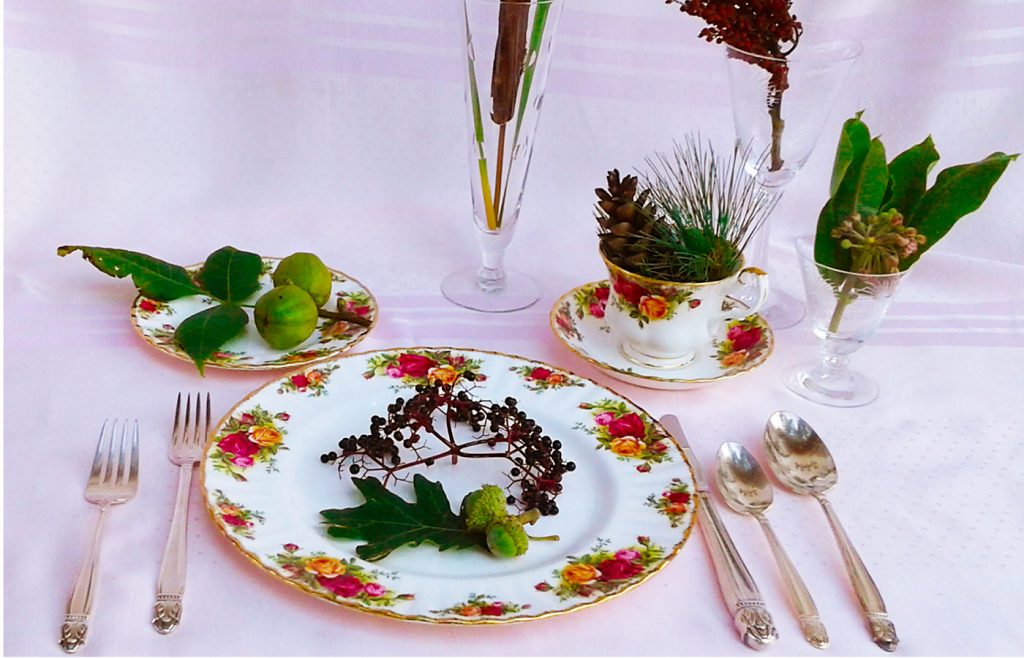
With the end of summer’s long days fast approaching, are you craving something a little out of the ordinary? A memorable experience of rare delights and undomesticated tastes? Maybe something outside of your comfort zone? The Iowa Master Naturalists have cooked up an adventurous evening that’s also a fundraiser for their fabulous, all-volunteer organization. A Wild Food Tasting on September 22 will feature folk music from the Awful Purdies as well as an intriguing menu of wild edibles.
“It’ll be a great date for the equinox.” says organizer and Iowa Master Naturalists Executive Director Elisabeth Swain. Set up like a full-course meal, only with small, taster-sized portions, the menu includes appetizers, salads, entrees, desserts, and aperitifs, all made with wild ingredients.
Swain came up with the idea of serving food from the wild after Nicole Upchurch, a member of the Iowa City band the Awful Purdies, approached her about doing a fundraiser. Upchurch attended the Iowa Master Naturalists program last summer and wanted to help out.
“I’m an advocate of music, nature, and community,” says Nicole. “I am intrigued by this event and thrilled to perform!”
While working on their third album, All Recipes Are Home, which focused on farming and food production, the Awful Purdies developed a deep appreciation for those working to conserve the natural world. “The Iowa Master Naturalists organization teaches important skills about living in harmony with our natural environment,” says Katie Roche, accordion player for the Awful Purdies. “It’s really cool that people will be able to sample the most local of local foods—stuff that you can find growing naturally all around Iowa.”
Participants will be seated and each taster course will be brought to them, while the Awful Purdies provide musical ambiance. A brief discussion of the offered foods will proceed each course. The menu features such delectables as venison sausage, purslane pickles, cattail pollen muffins (recipe at right), bison sliders with wild plum chutney, daylily and Jerusalem artichoke salad, gooseberry crisp, cricket flour biscotti, and the romantically named “Butterfly Kisses,” a beverage flavored with milkweed flowers.

Iowa Master Naturals in training get a lesson in insect identification from retired UI biology faculty member Jeff Klahn. (photo by Jerry Denehy).
The recipes have all been taste-tested to ensure deliciousness. Most recipes feature wild foraged edibles gathered by Iowa Master Naturalists from the area. The meats and cricket flour are commercially sourced to ensure safe handling.
“Many of Iowa’s edible plants are nonnative weeds, originally brought over to the U.S. for culinary usage,” says Swain. These plants escaped kitchen gardens and proliferated in the wild. She says foraging wild edibles is a good use for weeds, adding wryly, “We should all eat more garlic mustard.”
Swain grew up foraging, and remembers enjoying wild plums above all else. Of the wild plum chutney on the menu, she says, “It’s truly delicious.”
While Swain has experience with many wild edibles, preparing for this event exposed her to some new foods. She was surprised to discover how tasty daylily tubers can be. “They’re wonderful, a really superior vegetable.”
And speaking of new foods, Swain and other recipe testers have had fun experimenting with cricket flour. One of the more unusual ingredients on the menu, cricket flour has gotten a lot of press lately as a hot new health food.
“Cricket flour is very ecological,” says Swain. “The carbon footprint is much smaller for insects than even fish or chicken. I was very eager to experiment with it.” While the idea of eating cricket flour may make some people squeamish, cricket flour actually has a mild, slightly nutty taste. For less adventurous palates, there will be alternative cricket-free desserts.
Iowa Master Naturalists
The Iowa Master Naturalists program is totally staffed by volunteers. This truly valuable resource creates environmental stewards for our state by offering classes in all aspects of Iowa’s natural history, from animals and rocks to plants and prairies. A new session runs September 11 through November 27 on Monday evenings at the Wickiup Hill Nature Education Center near Cedar Rapids. To learn more, visit Iowa Master Naturalists or email info@iowamasternaturalists.org.

Iowa Master Naturalists get hands-on lessons about Iowa’s fish at the Mississippi River Aquarium. (photo by Sue Travis)
RSVP for the Wild Food Tasting
The Wild Food Tasting, with music by the Awful Purdies, begins at 7 p.m. on Friday, September 22, at Old Brick, 26 E. Market St., Iowa City.
Tickets are $15 per person. Reservations are recommended, although you can take a chance and pay at the door. Reserve your tickets online at Iowa Master Naturalists.
• • •
If you’d like to sample some foraged food in your own kitchen, try this recipe from Elisabeth Swain, with notes on her own foraging adventures.
Cattail Pollen Mini Muffins
(makes 32)
One of the joys of foraging is that you see many other wonderful things in the wild besides your quarry. As I was paddling in from collecting cattail pollen at Conesville Marsh last June, two sandhill cranes flew up just 20 feet from my kayak. Their great pterodactyl-like silhouettes against the setting sun and their strange rattling calls were a privilege to encounter. Now I never make cattail pollen muffins without thinking of them.
1 cup all-purpose flour
1 cup cattail pollen (you can use less pollen and replace it with all-purpose flour, but the more pollen you use, the more brilliantly yellow the final product!)
4 Tbsp. sugar
1 Tbsp. baking powder
1/2 tsp. salt
2 eggs
1 cup milk
1/4 cup oil
Preheat oven to 350° F. Gently mix all ingredients together. Spoon batter into mini-muffin tins, filling half full. Bake for 10–12 minutes.
Note: The protein content of cattail pollen is so high that when I accidently omitted the eggs, the muffins rose adequately anyway. For lighter muffins, however, include the eggs.
